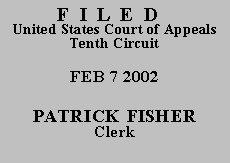

|
UNITED STATES OF AMERICA,
v.
NAKISHA JOHNSON |
98-CR-93-T) (Western District of Oklahoma) |
Before KELLY, McKAY, and MURPHY, Circuit Judges.
Appellant Nakisha Johnson is before this court seeking a certificate of appealability ("COA"). Until Johnson obtains a COA, she cannot appeal the district court's denial of her motion to vacate, set aside, or correct sentence brought pursuant to 28 U.S.C. § 2255. See 28 U.S.C. § 2253(c)(1)(b) (providing that a petitioner may not appeal the denial of a § 2255 motion unless she first obtains a COA). Johnson has not made "a substantial showing of the denial of a constitutional right," and, therefore, this court denies Johnson's request for a COA and dismisses the appeal. See id. § 2253(c)(2).
After a jury trial, Johnson was convicted of one count of conspiracy to possess with intent to distribute crack cocaine in violation of §§ 841(a) and 846 and one count of distribution of crack cocaine in violation of § 841(a). Johnson was sentenced to one hundred fifty-one months' incarceration and a five-year term of supervised release. On direct appeal, this court affirmed Johnson's convictions. See United States v. Evans, No. 99-6184, 2000 WL 219969 (10th Cir. Feb. 25, 2000) (unpublished disposition). Johnson then filed the instant § 2255 habeas petition. In her petition, Johnson reasserted the two claims raised on direct appeal and raised five additional claims, including an Apprendi(1) claim.
The district court first concluded that the two claims raised and disposed of on direct appeal could not be reasserted in the § 2255 motion. See United States v. Prichard, 875 F.2d 789, 791 (10th Cir. 1989) ("Absent an intervening change in the law of a circuit, issues disposed of on direct appeal generally will not be considered on a collateral attack by a motion pursuant to § 2255."). The district court also determined that the claims not raised on direct appeal were procedurally barred unless Johnson could show cause and prejudice for the default or demonstrate that a fundamental miscarriage of justice would result if her claims were not considered. See Coleman v. Thompson, 501 U.S. 722, 750 (1991). The district court considered whether Johnson's failure to raise the claims was the result of ineffective assistance of counsel. See United States v. Cox, 83 F.3d 336, 341 (10th Cir. 1996) ("A defendant may establish cause for procedural default by showing he received ineffective assistance of counsel."). The district court ultimately concluded that Johnson had failed to show either constitutionally deficient performance on the part of her counsel or that she was prejudiced by the alleged deficient performance. See Strickland v. Washington, 466 U.S. 668, 687 (1984). The court also concluded that Johnson's unsupported assertion of actual innocence was insufficient to satisfy the fundamental miscarriage of justice standard. See Herrera v. Collins, 506 U.S. 390, 404 (1993).
Johnson seeks a COA only for her Apprendi claim, her double jeopardy claim, and her claim that her sentence was improperly enhanced because of her co-defendant's possession of a handgun. We agree with the district court that all of these claims lack merit.(2)
Thus, counsel's failure to raise them on direct appeal does not constitute constitutionally ineffective assistance of counsel. See United States v. Cook, 45 F.3d 388, 393 (10th Cir. 1995).
Johnson is not entitled to a COA unless she can make "a substantial showing of the denial of a constitutional right." 28 U.S.C. § 2253(c)(2). Johnson can make that showing by demonstrating that: (1) the issues raised are debatable among jurists, (2) a court could resolve the issues differently, or (3) that the questions presented deserve further proceedings. See Slack v. McDaniel, 529 U.S. 473, 483-84 (2000).
This court has reviewed Johnson's request for a COA, Johnson's appellate brief, the district court's order, and the entire record before us. That review demonstrates that the district court's disposition of Johnson's § 2255 motion is not deserving of further proceedings, debatable among jurists of reason, or subject to different resolution on appeal. Accordingly, Johnson has failed to make the required substantial showing of the denial of a constitutional right and is not entitled to a COA. See 28 U.S.C. § 2253(c)(1)(b). This court denies Johnson's request for a COA for substantially those reasons set forth in the district court's order dated May 15, 2001, and dismisses this appeal. Johnson's motion to proceed in forma pauperis on appeal is granted.
ENTERED FOR THE COURT
Michael R. Murphy
Circuit Judge
*. This order and judgment is not binding precedent, except under the doctrines of law of the case, res judicata and collateral estoppel. The court generally disfavors the citation of orders and judgments; nevertheless, an order and judgment may be cited under the terms and conditions of 10th Cir. R. 36.3.
1.See Apprendi v. New Jersey, 530 U.S. 466 (2000).
2.Johnson's Apprendi claim relating to the term of her supervised release lacks merit because § 841(b)(1)(C) does not set a maximum term for supervised release. See United States v. Heckard, 238 F.3d 1222, 1237 (10th Cir. 2001), (holding that "§ 841(b)(1)(C) is not restricted by U.S.S.G. § 5(D)1.2(a) or [18 U.S.C.] § 3583(b)(2) from establishing terms of supervised release greater than three years"); United States v. Aguayo-Delgado, 220 F.3d 926, 933 (8th Cir. 2000) (holding that the maximum sentence of supervised release under § 841(b)(1)(C) is life). Although Johnson asserts that she received a one hundred fifty-one month term of supervised release, the record reveals that Johnson received a five-year term of supervised release.